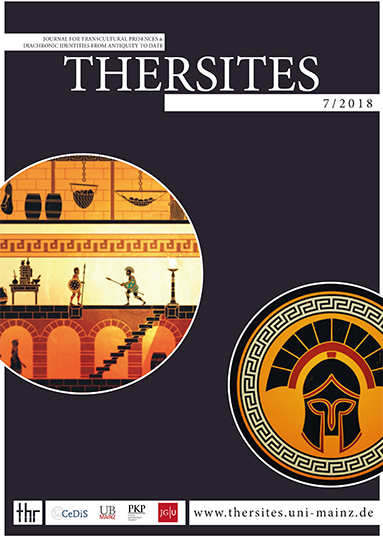Feminist heroines for our times: Screening the Amazon Warrior in Wonder Woman (1975 – 1979), Xena: Warrior Princess (1995 – 2001) and Wonder Woman (2017)
DOI:
https://doi.org/10.34679/thersites.vol7.85Keywords:
Amazons, Feminism, Wonder WomanAbstract
Wonder Woman (1975 – 1979), Xena: Warrior Princess (1995 – 2001), and Wonder Woman (2017) are films all feature a female action hero alongside Amazon characters based on the Amazons from Greek mythology. This paper discusses the pilot episode of Wonder Woman from 1975, the Xena: Warrior Princess episode ‘Hooves and Harlots’ (1995) and Wonder Woman (2017) in the light of contemporary feminism, to understand how far these popular media texts can be seen to promote feminism through their depictions of all-female Amazon societies, and their Amazonian female protagonists. My analysis is supported by viewer responses obtained from screenings and online questionnaires.References
Bergstrom (2017). – Signe Bergstrom Wonder Woman: Ambassador of Truth (New York HarperCollins 2017).
Blondell (2005). – Ruby Blondell, ‘How to Kill an Amazon’. Helios 32.2 (2005) 183-213.
Byrne (2017). – Wonder Woman by John Byrne, Book One (Burbank CA DC Comics 2017).
Daniels (2000). – Lee Daniels, Wonder Woman the Complete History: The Life and Times of the Amazon Princess (London Titan 2000).
Douglas, Susan J. (1995) Where the Girls Are: Growing Up Female with the Mass Media, New York: Random House.
Gietzen and Gindhart (2015). – Andreas Gietzen and Marion Gindhart ‘Project(ion) Wonder Woman: Metamorphoses of a Superheroine’ in Filippo Carla and Irene Beri (eds.), Ancient Magic and the Supernatural in the Modern Visual and Performing Arts (London and New York: Bloomsbury 2015) 134-150.
Gillis, Howie and Munford, eds. (2007). – Stacy Gillis, Gillian Howie and Rebecca Munford, Third Wave Feminism: A Critical Exploration (Expanded Second edition) (Basingstoke Palgrave Macmillan 2007).
Gosling (2017). – Sharon Gosling, Wonder Woman: The Art and Making of the Film (London Titan 2017).
Helford (2000). – Elyce Rae Helford, ‘Feminism, Queer Studies and the Sexual Politics of Xena: Warrior Princess’, in Elyce Rae Helford, ed,. Fantasy Girls: Gender in the New Universe of Science Fiction and Fantasy Television (Lanham Maryland and Oxford Rowman and Littlefield 2000). 135-162
Inness (1999). – Sherrie Inness, Tough Girls: Women Warriors and Wonder Women in Popular Culture (Philadelphia, Pennsylvania University of Pennsylvania Press 1999).
Kastor (1996). –Elizabeth Kastor, ‘Woman of Steel: Television’s Warrior Xena is a Superheroine with Broad Appeal’. The Washington Post, 21 September (1996) C01.
Kvistad (2005). – Ivar Kvistad, ‘Xena’s Double-Edged Sword: Sapphic Love and the Judaeo-Christian Tradition’, Refractory, 8.1 (2005, online) http://refractory.unimelb.edu.au/2005/10/14/xena%E2%80%99s-double-edged-sword-sapphic-love-the-judaeo-christian-tradition-ivar-kvistad/.
Lepore ((2015). – Lepore, Jill, The Secret History of Wonder Woman (Brunswick, Victoria and London Scribe 2015).
Magoulik (2006). – Mary Magoulik, ‘Frustrating Female Heroism: Mixed Messages in Xena, Nikita and Buffy’, The Journal of Popular Culture, 39.5 (2006) 729-755.
Mainon and Ursini (2006). – Dominique Mainon and James Ursini, The Modern Amazons: Warrior Women on Screen (Pompton Plains, New Jersey Limelight 2006).
Marston (1943). – William Marston, ‘Why 100,000,000 Americans read comics’. The American Scholar, 13 (1943) 35–44, available online at https://theamericanscholar.org/wonder-woman/#.W3BCWPZFzZs.
Morreale (1998). – Joanne Morreale, ‘Xena: Warrior Princess as Feminist Camp’, Journal of Popular Culture (1998) 79–86.
O’Reilly (2005). – Julie D. O’Reilly, ‘The Wonder Woman Precedent: Female (Super)Heroism on Trial’, The Journal of American Culture, 28.3 (2005) 273-283.
Paglia (2017). – Camille Paglia, Free Women, Free Men: Sex, Gender, Feminism (Edinburgh Canongate 2017).
Penrose (2016). – Water Duvall Penrose Jr, Postcolonial Amazons: Female Masculinity and Courage in Ancient Greek and Sanskrit Literature (Oxford Oxford University Press 2016).
Salmonson (1992). – Jessica Amanda Salmonson, Encyclopedia of Amazons: Women Warriors from Antiquity to the Modern Era (Doubleday New York 1992).
Salmonson(1979). – Jessica Amanda Salmonson, ed., Amazons! (New York DAW 1979).
Salmonson (1982). – Jessica Amanda Salmonson, ed., Amazons II (New York DAW 1982).
Walker (1992). – Rebecca Walker, ‘Becoming the Third Wave’, Ms Spring (1992) 39–41, available online at http://www.msmagazine.com/spring2002/BecomingThirdWaveRebeccaWalker.pdf.
Downloads
Published
Issue
Section
License
Copyright (c) 2018 Amanda Potter

This work is licensed under a Creative Commons Attribution-NonCommercial 4.0 International License.
Authors who publish with thersites agree to the following terms:
- Publishing in thersites is free of any charges.
- Authors retain copyright and grant the journal right of first publication.
- Users are allowed to read, download, copy, distribute, print, search, or link to the full texts of the articles, or use them for any other lawful purpose, without asking prior permission from the publisher or the author, so long as the original work is properly cited and is not used for commercial purposes. The journal is published under the Creative Commons Attribution 4.0 International License. More information about this license is available at https://creativecommons.org/licenses/by/4.0/.
- Authors are able to enter into separate, additional contractual arrangements for the non-exclusive distribution of the journal's published version of the work (e.g., post it to an institutional repository or publish it in a book), with an acknowledgement of its initial publication in this journal.
- Authors are permitted and encouraged to post their work online (e.g., in institutional repositories or on their website) as it can lead to productive exchanges, as well as earlier and greater citation of published work (See The Effect of Open Access).


